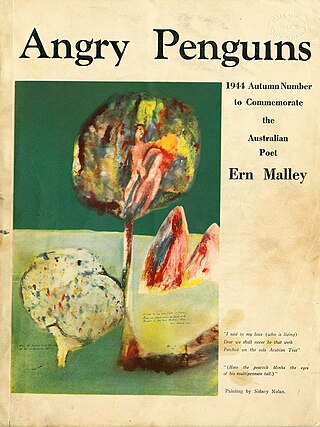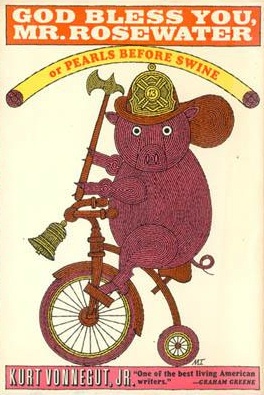
A pen name or nom-de-plume is a pseudonym adopted by an author and printed on the title page or by-line of their works in place of their real name.

Philip José Farmer was an American author known for his science fiction and fantasy novels and short stories.
Bob Zmuda is an American writer, comedian, producer, and director best known for his collaboration with comedian and performance artist Andy Kaufman.

Jakob Maria Mierscheid MdB has been a fictitious politician in the German Bundestag since 11 December 1979. He was the alleged deputy chairman of the Mittelstandsausschuss of the Bundestag in 1981 and 1982. According to his official biography, he was born in Morbach/Hunsrück, a very rural constituency in Rhineland-Palatinate. He is Catholic and a member of the Social Democratic Party of Germany.

Breakfast of Champions, or Goodbye Blue Monday is a 1973 novel by the American author Kurt Vonnegut. His seventh novel, it is set predominantly in the fictional town of Midland City, Ohio, and focuses on two characters: Dwayne Hoover, a Midland resident, Pontiac dealer and affluent figure in the city, and Kilgore Trout, a widely published but mostly unknown science fiction author. Breakfast of Champions deals with themes of free will, suicide, and race relations, among others. The novel is full of drawings by the author, substituting descriptive language with depictions requiring no translation.
This article covers various hoax letter writers.

The Ern Malley hoax, also called the Ern Malley affair, is Australia's most famous literary hoax. Its name derives from Ernest Lalor "Ern" Malley, a fictitious poet whose biography and body of work were created in one day in 1943 by conservative writers James McAuley and Harold Stewart in order to hoax the Angry Penguins, a modernist art and literary movement centred around a journal of the same name, co-edited by poet Max Harris and art patron John Reed, of Heide, Melbourne.

God Bless You, Mr. Rosewater, or Pearls Before Swine, Kurt Vonnegut's fifth novel, was published in 1965 by Holt, Rinehart and Winston and as a Dell mass-market paperback in 1970. A piece of postmodern satire, it gave context to Vonnegut's following novel, Slaughterhouse-Five, and shared in its success.
Isaac Bickerstaff Esq was a pseudonym used by Jonathan Swift as part of a hoax to predict the death of then-famous Almanac-maker and astrologer John Partridge.
Fictitious or fake entries are deliberately incorrect entries in reference works such as dictionaries, encyclopedias, maps, and directories, added by the editors as copyright traps to reveal subsequent plagiarism or copyright infringement. There are more specific terms for particular kinds of fictitious entry, such as Mountweazel, trap street, paper town, phantom settlement, and nihilartikel.
Kilgore Trout is a fictional character created by author Kurt Vonnegut (1922–2007). Trout is a notably unsuccessful author of paperback science fiction novels.
A gag name is a pseudonym intended to be humorous through its similarity to both a real name and a term or phrase that is funny, strange, or vulgar. The source of humor stems from the double meaning behind the phrase, although use of the name without prior knowledge of the joke could also be funny. Examples of the use of gag names occur in works of fiction in which there is a roll call, a listing of names, or a prank call.
Plainfield Teachers College was an imaginary college, created as a hoax, that fooled The New York Times sports department and college football fans across the country.

Georg Paul Thomann was purported to be a renowned Austrian conceptual artist of the late 20th century. In reality, he was the fictitious creation of the Austrian art group monochrom who started working on his biography in the summer of 2000.

Literary forgery is writing, such as a manuscript or a literary work, which is either deliberately misattributed to a historical or invented author, or is a purported memoir or other presumably nonfictional writing deceptively presented as true when, in fact, it presents untrue or imaginary information or content. These deceptive practices have a long history and have occurred across various literary traditions, often with significant cultural or financial impacts.

Kris Saknussemm is a cult novelist and multimedia artist. Born and educated in America, he has lived most of his life abroad, primarily in Australia and the Pacific Islands. He has published ten books that have been translated into 22 languages.

"History of the Necronomicon" is a short text written by H. P. Lovecraft in 1927, and published in 1938. It describes the origins of the fictional book of the same name: the occult grimoire Necronomicon, a now-famous element of some of his stories. The short text purports to be non-fiction, adding to the appearance of "pseudo-authenticity" which Lovecraft valued in building his Cthulhu Mythos oeuvre. Accordingly, it supposes the history of the Necronomicon as the inspiration for Robert W. Chambers' The King in Yellow, which concerns a book that overthrows the minds of those who read it.
Ctenophthalmus nepalensis was a fictional species of parasitic flea described by a pseudonymous author Otto Suteminn in 1969 as part of a scientific hoax. The description was published in the journal Zeitschrift der Arbeitsgemeinschaft Österreichischer Entomologen to ostensibly to demonstrate how poor their editorial process was. The hoax was uncovered only in 1973.








